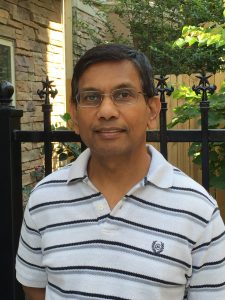Revised March 9, 2017; November 10, 2018; August 13, 2019; November 11, 2023
My name is Lal Ariyaratna Pinnaduwage. I loved physics from my school days and became a physicist, a Senior Scientist at the Oak Ridge National Laboratory, and a Research Professor at the University of Tennessee, Knoxville. I was elected a Fellow of the American Physical Society in 2004. Since retiring in 2009 at age 55, I have been on a quest to uncover the pure Dhamma of the Buddha.
Even though I am a Buddhist by birth, I did not really “practice” until I retired. Initially, it was to find out what “Buddhism” really was and how it compared with other world religions.
- I provided the above description in keeping with my intention to be fully open. Also, I intend to make the website “as experienced” by myself. I will specifically mention what I have not experienced as such. I will record my progress on these web pages as much as possible. (Not everybody will have the same experiences related to samadhi, jhāna, or magga phala).
- I have found that Buddha Dhamma differs from other religions and the many forms of “Buddhism” today. Other religious and cultural influences have contaminated even the Theravada version.
In July 2013, I discovered new interpretations of anicca, dukkha, and anatta (true Nature of existence). It was “the main missing piece” for me. I will never forget the ecstatic feeling while listening to that fateful desana from one Thero on July 30, 2013, on the internet. I traveled to Sri Lanka and found more information, even though I could not meet Venerable Waharaka Abhayaratanalankara Thero, who had uncovered the teachings. What I present here is this complete picture, with my input from my science background.
- Waharaka Thero passed away on February 9, 2017; see “Parinibbana of Waharaka Thero.” Many of his discourses are available at “waharaka.com” (explore the top menu!). Unfortunately, those desanas are available only in the Sinhala language.
- As in science, here, I will treat Buddha Dhamma as a theory and explore whether it provides a consistent picture of our world. Buddha Dhamma is a complete worldview, and its principles are the laws of Nature. Scientists have uncovered only a fraction of these laws and those about inert matter. But mind precedes matter.
I hope I can give you a taste of the exhilarating experience I have enjoyed over the past several years in uncovering the pure Dhamma. Buddha Dhamma is indeed for those who seek to broaden their horizons. You will benefit from this site if you leave behind any preconceived ideas about “Buddhism.”
- Above all, I wanted to convey the truth of the fact that one CAN experience the “cooling down” or “Nivana” or “Nibbāna” at various levels as one LEARNS AND LIVES the pure Dhamma. That is not something to be attained in future lives but is something that one CAN experience in this very life by cleansing one’s mind. What I describe here is what I have experienced to a large extent.
- Please ask your questions at the discussion forum; see below. If you have questions about personal Nature, please send them to me at [email protected].
- Buddha Dhamma is a self-consistent description of Nature’s laws. Any inconsistencies in these pages are due to my mistakes, and I should be able to correct them. I do revise these posts continuously as my understanding improves.
The Buddha said, “Sabba dānaṁ dhamma dānaṁ jināti,” or “Gift of Dhamma excels all other gifts.” Please inform others about this site if you benefit from it.
December of 2017: Discussion forum initiated: “Forum.”
Updates and new posts at “2- General Information and Updates“.
March 2018: A new section on “Quantum Mechanics and Dhamma.”
November 10, 2018: There are over 500 posts on the site today. There are two ways to find relevant posts on a given concept/ topic.
- All posts are under sections and subsections; see “Pure Dhamma – Sitemap. “One could scan through it to locate relevant posts.
- The “Search” button at the top right is also good at extracting relevant posts for a given keyword or keywords.
July 2019: New sub-section on “Origin of Life.”
April 2020: Re-writing the section on “The Five Aggregates (Pañcakkhandha).”
February 28, 2022: A new section highlighting the apparent contradictions in current English (and other languages) translations of key concepts in Buddha Dhamma, “Elephants in the Room.”
It is essential to know that there is a special convention for writing Pāli words: “Tipiṭaka English” Convention Adopted by Early European Scholars – Part 1.” There is also a “Pāli Glossary – (A-K).”
November 2023: Detailed and deeper analysis of the fundamental concepts: “Is There a “Self”?“


